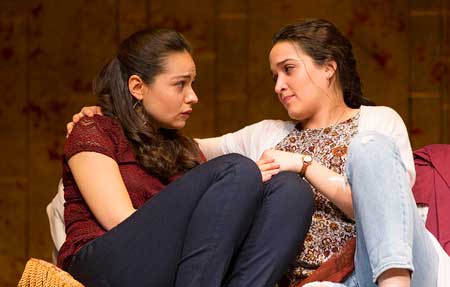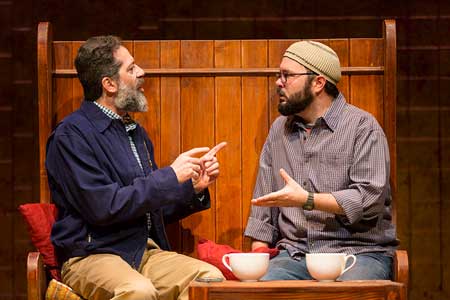Play (2014)
by Ayad Akhtar
Directed by M. Bevan O’Gara
Huntington Theatre Company
Boston Center for the Arts
South End, Boston
March 31 – May 7, 2017
Scenic Design: Cristin Todesco; Original Music: Sarawathi Jones
With Aila Peck (Zarina), Turna Mete (Mahwish), Rom Barkhordar (Afzal), Joseph Marrella (Eli)

Aila Peck as Zarina
in “The Who And The What”
Photo: © T. Charles Erickson
Courtesy of Huntington Theatre Company
Member of a somewhat traditional Muslim family, Zarina (Aila Peck) is bright and also rebellious. Having been disappointed in love while in graduate school, she devotes herself wholeheartedly to a book project, the nature of which she does not share. Worried about her lack of a mate, her observant father, Afzal (Rom Barkhordar) seeks out one for her and lands on an American convert to Islam, Eli (Joseph Marrella). Zarina’s sister, Mahwish (Turna Mete), is married to a Muslim guy and she shares with Zarina all of the gory details of their intimate relationship, and reveals as well some of her more honest yearnings.
Widowed, and with only two daughters, Afzal is not exactly like Tevye, the God-wrestling dairyman of Sholom Aleichem stories which inspired the 1960s hit musical Fiddler on the Roof, but close enough to draw comparison. Afzal is a Muslim traditionalist, but living enough within the contemporary world of America to have to face many of its challenges. Those challenges surface principally in the lives of his daughters, and most poignantly and with greatest difficulty when Zarina reveals that her book touches on his deepest tenets of faith.
This play has its moments, revealing something in the characters of its four characters of the conflicts between traditionalism and modernity, faith and doubt, religious life and secularity. It raises, fairly courageously, some of the kinds of issues raised years ago by Salman Rushdie, the response to whose Satanic Verses in certain traditional corners threatened a violent reaction.

Joseph Marella as Eli
in “The Who And The What”
Photo: © T. Charles Erickson
Courtesy of Huntington Theatre Company
Akhtar’s play is bold and well-meant in that regard and makes a determined and earnest effort to show how devoted questioning of the tradition is both itself courageous and threatening to traditional structures.
That said, the play itself conveys the issues in a way that has some compelling moments and some that do not ring true.
There is, in the second act, an argument, for example, between a husband and wife that seems engineered to create drama rather than exhibiting what seems like a natural outgrowth of the drama implicit in the situations described by the characters up to that point.
In the penultimate scene, when Zarina’s writing is exhibited, there is understandably a strong reaction by Afzal, but Mahwish also joins in wholeheartedly in a way that seems disingenuous, given all that she has revealed to her sister. It creates melodrama rather than a genuine outgrowth of the complexities of the characters.
And the ending brings along some of the elements of Fiddler On The Roof, realistic but modulated, but adds a sentimental component which draws a response that seems out of kilter with what has come before. Rather than ennobling the stances, it serves to add an extreme swing of responses.
I found that Disgraced, Akhtar’s earlier work which was also produced by the Huntington Theatre, raised some important issues but did not quite follow through on the promise. The issues that The Who And The What raises are more poignant and unsettling, but I would make a similar observation that the execution tends to be less developed than might be hoped for in response to the raising of these profound and significant issues
– BADMan
Leave a Reply